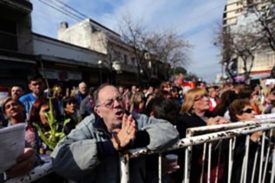
Inés San Martín
ROME (Crux) — Argentine Bishop Gustavo Zanchetta, one of Pope Francis’s first episcopal appointments in his home country, has been formally accused of sexually abusing seminarians and could face three to 10 years in prison.
The information was released on Friday by the prosecutor’s office in the Argentine northern province of Salta. Zanchetta was charged with “aggravated continuous sexual abuse committed by a minister of a religious organization.”
Zanchetta, the former bishop of Oran, was accused of “strange behavior” in 2015 when a diocesan secretary found pornographic pictures on the prelate’s phone. The images included gay porn featuring young men, but not minors, as well as images of Zanchetta touching himself. They were allegedly sent to unknown third parties.
Two years later, the bishop resigned from the diocese without explanation, but Francis appointed him to a newly created position at the Vatican’s Administration of the Patrimony of the Apostolic See (APSA), which serves as a central bank for the Vatican and oversees its financial holdings.
After the first reports of “strange behavior” were sent to the Vatican in 2015, some priests in the diocese began to scrutinize the actions of Zanchetta, especially his interactions with seminarians.
“I saw him hugging 16-year old boys, saw that the bishop was giving some of the students a beer, but nothing beyond that,” one person from Oran told Crux last March, but added that “after seeing the high-octane pornographic material in his phone, one begins to see everything as suspicious.”
Oran is a small diocese of 280,000 people in the province of Salta, at the foothills of the Andes.
On Thursday afternoon, prosecutor Mónica Viazzi charged him with sexual abuse aggravated by his position of authority as a bishop. Zanchetta had beeen scheduled to fly back to Rome on Friday; instead, his passport was confiscated and he was banned from leaving the country.
In a recent interview with a Mexican news station, Pope Francis revealed that Zanchetta is also facing a trial in the Vatican. If he’s found guilty of abusing minors – or vulnerable adults- he could be removed from the priesthood.
“Before I asked for his resignation, there was an accusation, and I immediately made him come over with the person who accused him and explain it,” Francis told Mexican journalist Valentina Alazraki.
According to Pope Francis, Zanchetta argued that his phone had been hacked, and the pontiff believed him, so he sent the bishop back to Oran.
“Evidently he had, some say, despotic treatment of others – he was bossy,” and a “not completely clear dealing of finances,” though as the pope noted, this hasn’t been proven.
“But certainly, the clergy didn’t feel well treated by him,” Pope Francis said. “They complained until they made an allegation as a body to the Nunciature,” the Vatican’s embassy in Argentina.
Pope Francis says that he then called the nuncio, who told him that the allegation of mistreatment was “serious,” and the pontiff understood it to be a case of “abuse of power.” So, he sent Zanchetta to Spain to receive psychological treatment and asked him to resign from the Diocese of Oran.
When it comes to the fact that Zanchetta is accused of misusing funds, Pope Francis said that at present there is no evidence of that, only that he wasn’t “ordered” when it came to money. Despite this, the pontiff said the bishop had a “good vision.”
Once he had a replacement for the bishop, he said, Pope Francis opened the investigation into the allegations against Zanchetta. He received the result of the investigation some 25 days ago, “and I decided that it’s necessary to have a trial. So, I gave it to the Congregation for the Doctrine of the Faith.”
When reports of the allegations first arose in the media, the Vatican insisted Zanchetta had had problems governing his diocese when he was transferred to Rome, and that Rome had not learned of the abuse allegations until late 2018.
On Friday, the public prosecutor’s office said that the prelate had remained silent during Thursday afternoon’s hearing, and that Zanchetta will undergo a psychological evaluation on June 12 as part of the investigation.
In addition to being prohibited from leaving the country, the bishop has been asked to get a permanent address in Argentina; attend all future hearings on his case; avoid contact with the victims or their families, and exerting any further physical or psychological abuse on the victims. If he were to violate any of these demands, he’d be taken into custody.
According to Enzo Gianotti, Zanchetta’s public defender, the bishop will comply with the requests made by the prosecutors.
